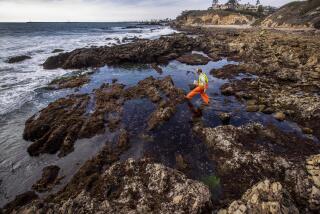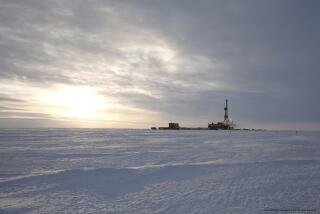TV Reviews : Three Perspectives on the Valdez Oil Spill
- Share via
The complex morass of issues triggered by the Exxon Valdez oil spill in Alaska’s Prince William Sound are perhaps too much for one documentary report to contain. But concerned viewers need not fret: In the media’s current love affair with things environmental, no less than three hourlong broadcasts on the Valdez disaster are airing in the next nine days, commemorating the spill’s first anniversary on March 24.
There is some inevitable overlap of information, but each approaches the event from slightly different angles. Together, not separately, they tell the full story.
Michael Tobias’ film, “Black Tide” (Sunday at 5 p.m. and 9 p.m. on the Discovery Channel), and the Cousteau Society’s “Outrage at Valdez” (March 25 at 7 p.m. on TBS) troll through the grim ecological aftershock: 11 million gallons of oil spilled (making it the largest spill in U.S. history), a slick the length of the Massachusetts-to-North Carolina coastline, an initial daily fatality toll of 30,000 birds and 1,000 sea otters.
That is only a portion of the non-human cost. The human blame, however, is most thoroughly explored by “Frontline’s” “Anatomy of an Oil Spill” (Tuesday at 9 p.m. on Channels 28 and 15, and 10 p.m. on Channel 50). Oregon Public Broadcasting reporter Jon Tuttle methodically pieces together the hour-by-hour action leading up to the midnight incident and also looks at the history of relations between oil companies and federal and Alaska state regulators.
Above all, this tragedy involves a whistle-blower to whom no one listened. Disturbed by years of bureaucratic sloth by Alyeska, the pipeline consortium responsible for spill clean-ups, Alaska Department of Environmental Conservation inspector Dan Lawn tried for years to alert officials to neglect and safety breakdowns at Valdez, where north shore Alaskan crude oil is deposited into huge tankers like the Exxon Valdez.
The pipeline and shipping operation was funded during the Nixon Administration on the promise that contingency plans would be in place to handle spills. But as Tuttle reports, the anticipated spill was a fraction of the actual Valdez accident. It was, in the words of one official, “the greatest piece of maritime fiction since ‘Moby Dick.’ ”
Incredibly, instead of developing stricter safety procedures over the past 10 years, Alyeska and the Coast Guard began to bend the rules, such as allowing tanker pilots to move out of the designated shipping lanes to avoid ice (“Frontline’s” computer-generated graphics dramatically show conditions in the Sound). Three months before March 24, Lawn stated that a major accident would eventually happen, and those responsible wouldn’t be able to handle the clean-up.
Tobias’ film, more stylishly made than the Cousteau project, shows how accurate Lawn was. His camera endlessly tracks around a behemoth pile of bagged, oil-damaged coastal rocks, bound for the incinerator. (Jean-Michel Cousteau notes in his program, though, that the incinerators didn’t always work as well as hoped). Tobias details the futility of the coastal cleaning, for the slick simply moved in and out with the tide, continuously contaminating the local food-chain.
Cousteau spends more time inquiring into the lives of the townspeople and fishing community. He talks to everyone, it seems, from the hired cleaner who insists that the spill was “good for the Alaskan economy,” to nervous-looking Alyeska official Theo Polasek, to despairing biologists (as usual with the Cousteau films, the narration strains for effect).
Both the Tobias and Cousteau films are unashamedly ecological in approach and argument. But while Tobias connects the Alaska spill with the proposed attempts to drill in the Arctic National Wildlife Refuge and to a series of recent oil spills around the world--some far larger than the Valdez--Cousteau takes an even longer leap into a whole list of eco-catastrophes, from Bhopal to Chernobyl. This, like Tobias’ plea for “a moral and spiritual” imperative for the future, is overkill. Both miss the point in the “Frontline” report--that Valdez resulted from misguided political considerations.
More to Read
Sign up for Essential California
The most important California stories and recommendations in your inbox every morning.
You may occasionally receive promotional content from the Los Angeles Times.













